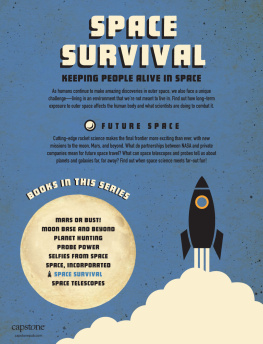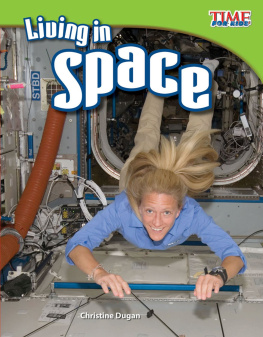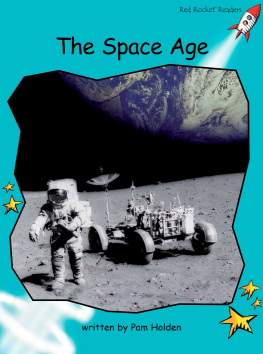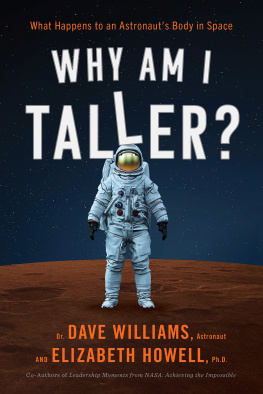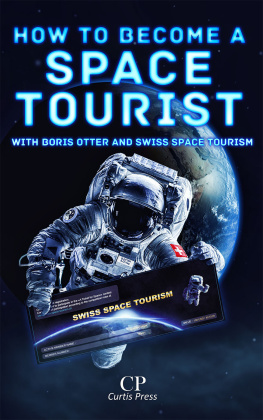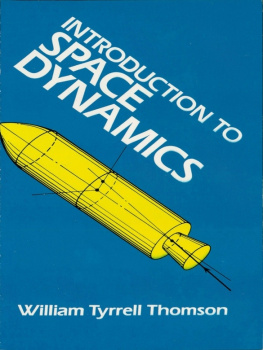Col. William R. Pogue - How Do You Go to the Bathroom In Space?
Here you can read online Col. William R. Pogue - How Do You Go to the Bathroom In Space? full text of the book (entire story) in english for free. Download pdf and epub, get meaning, cover and reviews about this ebook. City: New York;N.Y, year: 1985, publisher: Tom Doherty Associates, genre: Religion. Description of the work, (preface) as well as reviews are available. Best literature library LitArk.com created for fans of good reading and offers a wide selection of genres:
Romance novel
Science fiction
Adventure
Detective
Science
History
Home and family
Prose
Art
Politics
Computer
Non-fiction
Religion
Business
Children
Humor
Choose a favorite category and find really read worthwhile books. Enjoy immersion in the world of imagination, feel the emotions of the characters or learn something new for yourself, make an fascinating discovery.

- Book:How Do You Go to the Bathroom In Space?
- Author:
- Publisher:Tom Doherty Associates
- Genre:
- Year:1985
- City:New York;N.Y
- Rating:5 / 5
- Favourites:Add to favourites
- Your mark:
- 100
- 1
- 2
- 3
- 4
- 5
How Do You Go to the Bathroom In Space?: summary, description and annotation
We offer to read an annotation, description, summary or preface (depends on what the author of the book "How Do You Go to the Bathroom In Space?" wrote himself). If you haven't found the necessary information about the book — write in the comments, we will try to find it.
How Do You Go to the Bathroom In Space? — read online for free the complete book (whole text) full work
Below is the text of the book, divided by pages. System saving the place of the last page read, allows you to conveniently read the book "How Do You Go to the Bathroom In Space?" online for free, without having to search again every time where you left off. Put a bookmark, and you can go to the page where you finished reading at any time.
Font size:
Interval:
Bookmark:
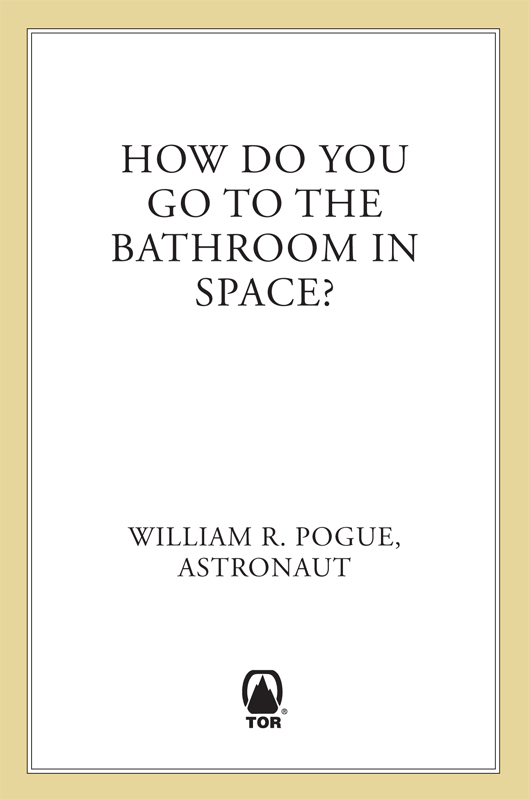

The author and publisher have provided this e-book to you without Digital Rights Management software (DRM) applied so that you can enjoy reading it on your personal devices. This e-book is for your personal use only. You may not print or post this e-book, or make this e-book publicly available in any way. You may not copy, reproduce, or upload this e-book, other than to read it on one of your personal devices.
Copyright infringement is against the law. If you believe the copy of this e-book you are reading infringes on the authors copyright, please notify the publisher at: us.macmillanusa.com/piracy.
Contents
What does it feel like in space?
How long does it take to get used to space?
Do you look the same in space?
Does your hair float out from your head?
What kind of work did you do on Skylab?
Was it hard to work while in a space suit?
How did you drink?
How did you bathe?
All the answers to all the questions you have about living in space, including the question most often asked
HOW DO YOU GO TO THE BATHROOM IN SPACE?
1. How old are you?
I was born in 1930. I was forty-three years old when our mission launched to visit Skylab and I celebrated my forty-fourth birthday while in space.
2. What is your academic background?
I have a Bachelor of Science degree in secondary education and a Master of Science degree in mathematics, and I taught undergraduate mathematics at the Air Force Academy.
3. Are you a graduate of a service academy?
No, I attended a civilian college and received my commission through the Air Force aviation cadet program during the Korean conflict.
4. Which branch of the military (service) were you in? How long?
I was in the Air Force for twenty-five years, nine of which were spent with NASA as an astronaut.
5. What kind of airplanes have you flown?
Over fifty types and models of American and British aircraft, mostly fighter aircraft.
6. What kind of airplane did you fly in Korea?
The F-84G, a fighter-bomber.
7. When did you fly with the Thunderbirds? What airplane did you fly with the aerobatic team? What position?
I flew with the Thunderbirds, the Air Force aerobatic team, from 1955 to 1957. I flew as solo pilot in the F-84F and F-100C, and for over a year, also in the F-100C, I was slot pilot in the diamond formation.
8. Which do you think was riskier, flying with the Thunderbirds or going into space?
Flying with the Thunderbirds was probably riskier, but I never thought of it as being dangerous. The most hazardous flying I ever did was instructing students in aerial gunnery training.
9. Which group of astronauts were you in? When were you selected to be an astronaut? When did you leave the space program?
I was in the fifth group of astronauts selected in 1966 and left the space program in September, 1977. I wanted to become an astronaut because it seemed to be the highest goal attainable for a pilot as well as being interesting and exciting work.
10. What were the names of the other men on your mission?
Colonel Gerald (Jerry) P. Carr, a Marine Corps fighter pilot, was the Commander and Dr. Edward (Ed) G. Gibson was the Scientist Pilot.
11. What do you think was Skylabs greatest contribution?
The greatest immediate contribution was the demonstration of mans ability to live and work in weightlessness for long periods (up to three months). The studies of the Earth and sun provided information for long-term investigations, and their full contribution may not be known for many years.
12. Arent you really thrown back at liftoff? (There is a widespread belief that the astronauts feel their strongest force effect from the engine thrust at the time of liftoff.)
The force on the astronaut at liftoff isnt as great as commonly believed. In the older Saturn boosters, the astronauts were pressed back in the couches at just a bit more than their normal body weight; an astronaut weighing 150 pounds, for instance, would feel like he weighed 165 pounds. On the Space Shuttle, the same astronaut would be pressed back into the seat with a force of about 225 pounds. This is much higher liftoff acceleration than felt on the older boosters, but it isnt nearly the force felt later on during boost. On Saturn boosters (rockets), the astronauts felt the most force just as the first stage of the rocket had burned up most of its fuelabout four times heavier than normal. The Space Shuttle thrust is controlled so that the most force the astronauts feel is about three times their normal weight.
13. What does it feel like in space?
The first thing you notice when you go into space is an absence of pressure on your body. You may feel lightheaded or giddy. After a half-hour or so, your face may feel flushed and you might feel a throbbing in your neck. As you move about, you will notice a strong sensation of spinning or tumbling every time you turn or nod your head. This makes some people uncomfortable or nauseated. You will also have a very full feeling or stuffiness in your head. You may get a bad headache after a few hours, and this too may make you feel sick at your stomach.
Most all of these symptoms will go away in a few days. The head congestion or stuffiness may bother you off and on during your entire time in space. Throughout the space flight, you will feel a powerful sensation of tumbling or spinning every time you move your head too fast.
There are two things you can do on Earth to get a reasonable idea what it feels like in space. The general floating feeling is quite similar to the effect of relaxing in a swimming pool. The head stuffiness experienced in space is much like the uncomfortable feeling that one gets when hanging upside-down from gymnast bars. Normally, it is uncomfortable to stay in this position beyond a minute or two because of the full feeling in the head caused by the upside-down position.
14. How long does it take to get used to space?
It takes the body about three days to adjust to the weightlessness. You will become accustomed to working in space in a few hours, but you will be learning better ways to do things throughout the mission. Even though I got sick the first evening in space, the following day, which was our first full day in orbit, I worked fourteen hours.
15. When sailors go to sea, they gradually get their sea legs. Did you get space legs after being in space for a while?
We did, quite literally, develop space legs. We called it bird legs, because our legs became thinner and thinner as the weeks passed. The calves, in particular, became quite small. During the first few days in space, the legs become smaller because the muscles of the legs force blood and other fluids toward the upper part of the body, thus decreasing the girth measurement around the thighs and calves. In addition, muscle tissue is progressively lost due to insufficient exercise. These changes produce a bird leg effect.
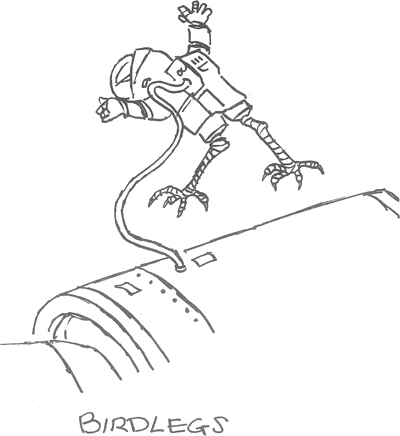
16. What happened to your body in space?
We grew 1 to 2 inches taller. This height increase was due to spinal lengthening and straightening. The discs between the vertebrae expand and compress slightly, depending on the weight the back is supporting. Even on Earth, an adult will be slightly taller (about one half-inch) in the morning than in the evening because the discs expand during sleep and compress as you walk or sit during the day. In weightlessness, the discs expand, but they dont compress again, because there is never weight on the spine. Our space suits were custom-tailored on Earth to our height and posture, thus, they fit tighter in space because of the height increase. Also, my waist measurement decreased by almost three inches, due to an upward shift of the internal organs in the body creating a wasp waist appearance.
Font size:
Interval:
Bookmark:
Similar books «How Do You Go to the Bathroom In Space?»
Look at similar books to How Do You Go to the Bathroom In Space?. We have selected literature similar in name and meaning in the hope of providing readers with more options to find new, interesting, not yet read works.
Discussion, reviews of the book How Do You Go to the Bathroom In Space? and just readers' own opinions. Leave your comments, write what you think about the work, its meaning or the main characters. Specify what exactly you liked and what you didn't like, and why you think so.

